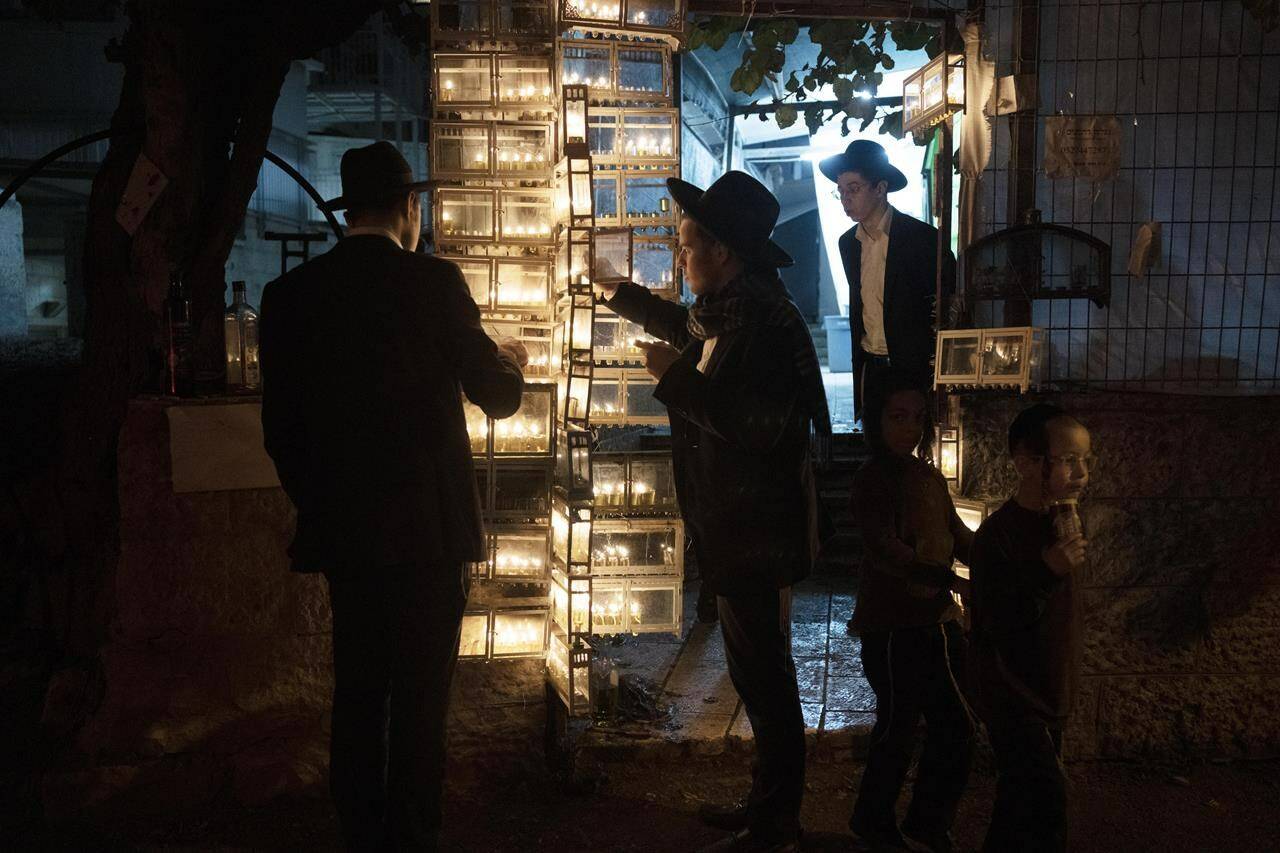While many Jewish Canadians prepare to light menorahs in celebration of Hanukkah starting Thursday, some say the Israel-Hamas war coupled with a rise in antisemitism may dim the festival of lights.
Daniel Thau-Eleff, a Winnipeg-based playwright, is among those who will mark the holiday celebrating the rededication of the Holy Temple in Jerusalem in the second century BC, even as they mourn current events.
“It’s a very happy and celebratory occasion and I’m finding it hard to be happy these days. It’ll probably be a challenge to just be happy and celebrate,” said Thau-Eleff.
His grief is multi-faceted, he said. There is grief for the Palestinians in Gaza and the West Bank, who were pummelled by Israeli fire as the military sought to tamp out Hamas following an Oct. 7 attack. There is also grief for the Israelis who were killed and taken hostage, used as bargaining chips. And then there is the pain caused by a rise in antisemitism and Islamophobia closer to home.
“And there’s this … battle over what can and can’t be said about all of the above, particularly on campuses. And I’m feeling pretty upset about all of the above,” he said.
The menorah is a central symbol of the eight-day celebration of Hanukkah, which celebrates the liberation of Jerusalem by a small group of Jewish fighters. They lit a menorah in the Holy Temple with a tiny supply of ritually pure oil, and it stayed lit for eight days.
The menorah is traditionally placed where it can be seen from the outside, such as a doorway or windowsill.
Even as Thau-Eleff grapples with his complex grief, he said he will display a menorah in his window as usual.
“The violent antisemitism we’re seeing in Winnipeg, the most overt antisemitism, is to my mind fairly slithery. It’s happening under cover of night,” he said. “But it is scary because it only takes one person to up this level of violence. What can we do about that, I don’t really know.”
Police forces across Canada have reported a rise in what they suspect are hate-motivated incidents in recent months, many of them antisemitic.
In Winnipeg, police have seen a rise in antisemitic graffiti, and say a home with a religious symbol near its front door had its windows shot out late last month. Nobody was injured.
Noah Shack, vice-president for countering antisemitism and hate with the UJA Federation of Greater Toronto, said the message of Hanukkah is particularly resonant given these incidents.
“Part of the Hanukkah celebration is publicizing the miracle and the imperative and value of religious freedom and freedom of identity and the ability to be who we are,” he said.
“And because of the rising antisemitism, there’s a real fear about being Jewish in public.”
He said he’s heard of some people who have stopped wearing items such as jewelry with symbols that identify them as Jewish, while others have removed mezuzahs from their door frames. Mezuzahs are cases containing small scrolls of parchment with passages from the Torah inscribed on them, positioned by the entrance to a home.
In Montreal, where a number of Jewish institutions have been targeted in apparent attempted arsons and two Jewish schools were shot at, some said they took comfort in Hanukkah’s message.
Helena Elana Plachcinski said the holiday reminds her of the importance of the Jewish plight.
“We’re still fighting. We’re still fighting from the time that we were occupied by the Greeks and we fought to keep our identity, which is our faith, and we didn’t let go. And we won. We’re here. So we won,” she said.
Even so, she does worry that Jewish Canadians may be targeted for displaying religious symbols such as the menorah. But that won’t stop her from lighting the candles in her front window.
“My parents were Holocaust survivors. So for me to be Jewish is very important. But whoever doesn’t like it, it’s too bad for them,” she said.
In Vancouver, Rabbi Jonathan Infeld with the Congregation Beth Israel synagogue said antisemitic attitudes have taken a toll on “the psychology and the mental health of the Jewish community.”
“With that being said, we as the Jewish community understand that if we stop doing Jewish activities, if we stop celebrating Jewish holidays, attending synagogues, celebrating holidays such as Hanukkah — which is intended to bring light into the world at the darkest moments of the year — that we have allowed Hamas and their supporters to win,” he said.
“While others may preach hate, we have to preach peace, and while others may intend for us to stop being Jewish and stop practising our religion, we have to do the exact opposite, especially at a time like this.”

